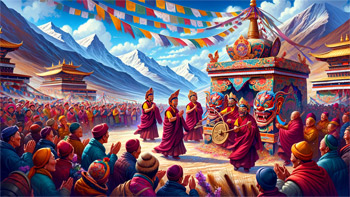Losar, the Tibetan New Year, is a festival of great significance in Buddhism, particularly within the Tibetan tradition. Celebrated over several days, Losar marks the beginning of the new year according to the Tibetan lunar calendar and is a time of renewal, purification, and joy. The festival, which usually falls in February or March, is not only a cultural celebration but also a spiritual observance, reflecting the rich traditions and religious practices of Tibetan Buddhism. This article delves into the history, customs, and spiritual aspects of Losar, highlighting its importance in the Buddhist community.
Historical Roots of Losar
Losar's origins can be traced back to the pre-Buddhist period in Tibet, where it began as a winter incense-burning ritual for local spirits. With the advent of Buddhism in Tibet, the festival gradually took on Buddhist elements and became a significant religious celebration. Over centuries, Losar has evolved, incorporating various cultural and spiritual practices that reflect the depth and diversity of Tibetan Buddhism.
Losar Celebrations and Customs
Losar is celebrated with a variety of customs and rituals that span several days. The preparations for Losar begin well in advance, with households undertaking thorough cleaning to rid homes of bad luck and welcome the new year with purity. Traditional decorations and offerings are arranged, including the creation of intricate butter sculptures and colorful prayer flags. The exchange of gifts and greetings is a common practice, fostering a sense of community and goodwill.
Spiritual Practices during Losar
Losar is not just a time for cultural celebration but also for spiritual renewal. Buddhists engage in prayers, meditation, and rituals during this period, seeking blessings for the new year. Monasteries perform special ceremonies, including the chanting of prayers and the display of sacred texts. These practices are believed to accumulate merit and bring about positive energy for the coming year.
Food and Festivities
Food plays an integral role in Losar celebrations. Traditional dishes such as "guthuk," a special noodle soup with nine ingredients, and "khapse," a deep-fried pastry, are prepared. These dishes have cultural and spiritual significance, symbolizing the dispelling of negative energies and the ushering in of prosperity and happiness.
Losar and the Tibetan Buddhist Community
For the Tibetan Buddhist community, Losar is a time to strengthen bonds within the community and reaffirm commitment to Buddhist values. It is an opportunity for people to gather, share experiences, and express gratitude. This communal aspect of Losar is fundamental, reflecting the Buddhist principles of compassion and interdependence.
Losar Across the World
With the global spread of Tibetan Buddhism, Losar is now celebrated by Tibetan communities and Buddhists worldwide. It has become an occasion for cultural exchange and understanding, allowing people from diverse backgrounds to experience and appreciate the richness of Tibetan culture and spirituality.
Modern Adaptations of Losar
In contemporary times, Losar has adapted to modern contexts while retaining its traditional essence. In addition to conventional practices, modern celebrations often include cultural performances, art exhibitions, and educational events about Tibetan culture and Buddhism. These adaptations ensure that the spirit of Losar remains vibrant and relevant in the modern world.
The Significance of Losar in Daily Practice
Losar extends beyond the festive period, influencing the daily practice of Buddhists. It serves as a reminder of the impermanent nature of life, encouraging practitioners to live with mindfulness, compassion, and a renewed dedication to spiritual growth. The festival inspires Buddhists to reflect on their actions and aspirations, seeking to align them more closely with the teachings of the Buddha.
In essence, Losar is a multifaceted festival encompassing cultural celebration, spiritual observance, and community bonding. It marks the beginning of a new year in the Tibetan calendar, offering an opportunity for reflection, purification, and renewal. As Buddhists around the world celebrate Losar, it continues to be a vibrant expression of Tibetan culture and Buddhist spirituality, fostering a sense of unity and aspiration towards a peaceful and compassionate life.
